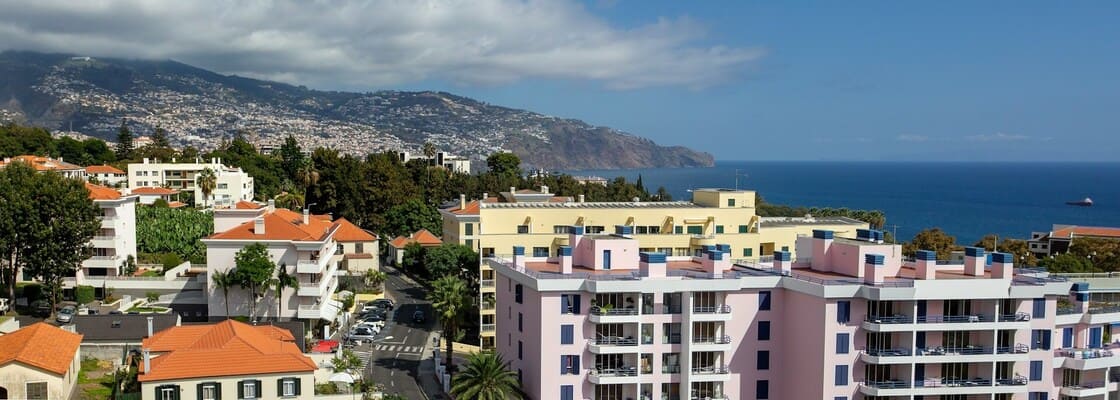With an array of gorgeous locations, from buzzing cities to splendid beaches, who wouldn’t want to own a property in Portugal? Factor in a high quality of life, a thriving real estate market, and affordable property prices, and you can quickly see why so many international buyers have snapped up property here.
However, as with owning property in any country, there will be property taxes that you will need to watch out for, including capital gains tax, which you may be subject to should you own property in Portugal and be looking to sell it.
In this article, Capital Gains Tax Portugal: Your Definitive Guide, we delve into what Capital Gains Tax is and what you will need to pay.
What is Capital Gains Tax?

Taxes can be complex, so let’s break it down as simply as possible. In short, capital gains refer to the profit generated from selling a property. This profit is subject to taxation, and the property owner must disclose the tax return for the year the property was purchased, including the purchase price.
If any work or maintenance was done on the property, such as installing a new heating system, this should also be declared. Invoices and amounts paid for these improvements need to be provided, as they will be included in the capital gains assessment.
If you want to reinvest your total selling price into a new property, then the potential capital gain may not be subject to the Portuguese capital gains tax. However, this exemption only applies if the house that you are selling is your permanent address and if this property corresponds with your tax address. Basically, you have Portuguese tax residency.
It’s also crucial to take into account the time period for when you reinvest the total selling price into a new property for you to be tax exempt. This needs to be done:
- 24 months before such a sale or;
- 36 months after the sale.
If you are reinvesting the selling price into a new property, the owner will need to inform the Portuguese Tax Authorities that this is their intention – that they intend to reinvest back into the Portuguese property market.
Capital Gains Tax for Portuguese Residents

In Portugal, residents are subject to capital gains tax on worldwide property and investments acquired from 1 January 1989 onwards. Capital gains on real estate are combined with other income for the year and taxed according to the income tax scale rates, which range from 14.5 percent to 48 percent.
Portuguese residents benefit from generous rules. For instance, since 2021, when you sell a property in Portugal, only 50 percent of the gain from the sale of real estate is subject to tax. Additional exemptions may also apply, so we highly recommend that you consult with a reputable financial advisor.
How to become a Portuguese resident?
If you are considering moving to Portugal, you will need to get a Portuguese residency permit. There are several options open to you, including the D7 Visa (also known as the retirement visa or passive income visa), which enables you to live in Portugal provided you have sufficient passive income, such as from a pension fund, real estate or capital, or financial investment.
Alongside this, the Portugal Golden Visa and the Digital Nomad Visa are also attractive options. The Golden Visa allows you to live in Portugal in return for an investment in the country, while with the Digital Nomad Visa, you can live in Portugal provided you work for a foreign (non-Portuguese) company and earn four times the national minimum wage. Our migration and residency partner, Global Citizen Solutions, offers more insight into visa options that will suit your needs.
Capital Gains Tax Exemptions for Portuguese Residents

If you are looking to sell your property in Portugal and reinvest in the Portuguese property market, you’ll definitely want to be aware of the crucial home exceptions for Portuguese residents.
If you reinvest the proceeds from a property sale into another main home in Portugal or anywhere in the European Union or European Economic Area (EU/EEA) that has a tax treaty with Portugal, you will not have to pay capital gains tax. As we’ve mentioned previously, the property must be your primary residence, and to qualify, you need to reinvest in the property market within 36 months after the sale or 24 months before the sale.
This tax exemption no longer applies to UK properties following the UK’s withdrawal from the EU- British expats selling their Portuguese property to reinvest in the UK will no longer benefit from this exemption.
In 2019, an additional capital gains relief was introduced for retirees. If you are retired or over the age of 65, you are exempt from capital gains tax if you reinvest the proceeds from your primary home into a pension income fund or eligible insurance contract within six months after the sale.
Portugal Capital Gains Tax for Non-Residents

If you are not a resident of Portugal and are looking to sell your property in Portugal, you will need to pay capital gains tax just like any other Portuguese citizen or resident. The section below gives an overview of Portugal capital gains tax for non-residents.
The capital gains on a property sale in Portugal are levied at a flat rate of 28 percent, but the amount that you will need to pay will depend on your residency status.
Residents of Portugal: Residents will pay capital gains tax on 50 percent of the capital gain from the property sale.
Non-residents of Portugal: You will be taxed on the full amount of the capital gain from the property sale.
Taxation on Rental Income

Given the high rental yields, you can secure your investment in Lisbon – for example, rental yields in the Lisbon Metropolitan Area stand at 6.7 percent in the Lisbon Metropolitan Area, 6 percent in the Porto Metropolitan Area, and 5.6 percent in the Algarve – buying property to rent out is a smart move. However, there are crucial taxes that you will need to be aware of regarding rental income.
In short, rental income is taxed at 25 percent, while other types of income are taxed at 28 percent. The tax rate applicable, either 25 percent or 28 percent, depends on the purpose of the rental agreement. Although tax rates may experience minor changes, they always fall within this range.
Additionally, it’s important to note that the 25 percent tax rate applies to long-term rental income from 2023 (for the entire year of 2023) in accordance with the Mais Habitação law passed in October 2023. This 25 percent rate can, however, be reduced depending on the duration of the rental contract.
- From a 2 to 5 year duration: 25 percent
- From a 5 to 10 year duration: 15 percent
- From a 10 to 20 year duration: 10 percent
- For a duration of longer than 20 years: 5 percent
How to Optimize Tax Efficiency in Portugal

We recommend seeking guidance from an accountant when dealing with your tax return regarding capital gains and taxation on rental property, especially if you do not speak Portuguese or are unfamiliar with the processes involved. They will help ensure that you are paying the right amount of taxes and that you apply for any deductions that you may be eligible for, saving you hassle and money in the long run.
With a comprehensive plan, you could substantially lower your tax liability and the amount of taxes on capital assets. For instance, certain life insurance policies offer notable tax advantages in Portugal. Consult with an experienced wealth manager to determine the best option for your situation and lower your capital gains tax exposure.
Finding an advisor with cross-border or international expertise can help you discover tax-efficient and compliant strategies for managing your financial assets, ensuring you don’t pay more taxes than necessary and lowering your overall tax bill, whether in Portugal or your home country.
Be Global Properties: Your Gateway to Real Estate Excellence
Be Global Properties provides you with access to the finest properties in the world, each of which tells a unique story. From properties that effortlessly blend chic modern designs with traditional architecture to those that convey an ageless charm. Contact BE Global Properties today and unlock the key to your new home.
Frequently Asked Questions about Capital Gains Tax Portugal
Does Portugal have Capital Gains Tax?
Yes, the Portuguese government charges tax on capital gains arising from the sale of property and capital gains arising from the sale of investments. If Portuguese tax residents and non-residents earn money from these sales, it is considered a taxable gain, and it becomes part of your tax obligations to declare the gain made in that Portuguese tax year with your annual tax return.
The applicable tax rate for capital gains is 28 percent. Residents of Portugal pay capital gains tax on 50 percent of the capital gain from the sale, while non-residents are taxed on the full amount of the capital gain from the property sale.
How do I avoid capital gains tax in Portugal?
Capital gains tax is the tax on the sale of real estate and applies to any individual selling any Portuguese property. If you reinvest the proceeds from selling a property into another primary residence in Portugal or within the EU/EEA with a tax treaty with Portugal, you can avoid capital gains tax. The reinvestment must occur within 36 months after the sale or 24 months before the sale.
Does Portugal have a wealth tax?
Portugal does not have a wealth tax. However, there is an additional tax paid by property owners for high-valued properties referred to as Additional to IMI (AIMI). Property owners who have purchased a property in Portugal that is valued at more than €600 000 will be subject to AIMI. The AIMI tax rates are calculated as follows:
0.7 percent tax on owning property valued between €600,001 and €1 million
1 percent tax on property valued between €1mil and €2 million
1.5 percent tax on property if its total value is above €2 million
The €600,0000 threshold applies per individual, so jointly owned properties only incur AIMI if valued over €1.2 million.
Is Portugal a tax haven?
No, Portugal is not a tax haven. Non-residents and residents pay taxes, including tax liability for real estate capital gains, and you will need to pay income tax on Portuguese-sourced income. When you sell property in Portugal or acquire any investment gains from the sale of other assets, the Capital Gains Tax rate is 28 percent for individuals and 25 percent for businesses. Tax residents pay 28 percent Capital Gains Tax on just 50 percent of their capital gains, while non-residents pay 28 percent on the full gain amount.
How much are capital gains in Portugal?
The Capital Gain Tax is 28 percent for individuals, both Portuguese residents (tax residents) and non-residents, and 25 percent for companies. For tax residents, only 50 percent of the gain is taxed at their progressive income tax rates.
How does capital gains tax work in Portugal?
Capital gains tax in Portugal applies to profits from the sale of capital assets located in Portugal. In Portugal, residents are subject to capital gains tax on worldwide property and investments acquired from 1 January 1989 onwards. Capital gains on real estate are combined with other income for the year and taxed according to the income tax scale rates, which range from 14.5 percent to 48 percent. Certain exemptions and deductions may apply based on the property’s use and reinvestment.
Is Portugal tax-free for expats?
You are considered a resident of Portugal if you reside in the country for 183 days (about six months) or more in a calendar year, and you must pay personal income tax on your worldwide income. If you live in Portugal for fewer than 183 days, you only need to pay tax on income earned within Portugal. Permanent residents of Portugal are also considered tax residents, and their worldwide income is taxed.
How much tax do foreigners pay in Portugal?
As an expat in Portugal, you become a Portuguese taxpayer and tax resident if you spend over 183 days in Portugal within a single calendar year or if you hold permanent residency in the country. Taxation of investment income is contingent upon your residency status in Portugal.
Foreign Portuguese residents are liable to the same progressive tax rates as Portuguese residents, ranging from 14.5 percent to 48 percent.
Are there any tax treaties that affect capital gains tax between Portugal and other countries?
According to PWC Portugal, if you reinvest the proceeds from a property sale into another main home in Portugal or anywhere in the European Union or European Economic Area (EU/EEA) that has a tax treaty with Portugal, then you will not have to pay tax on capital gains.
The property must be your primary residence, and to qualify, you will need to notify the Portuguese Tax Authority of your intention to reinvest in the property market within 36 months after the sale of your property market or 24 months before the sale.
Is there an inheritance tax in Portugal?
Portugal doesn’t have a conventional “inheritance tax”; instead, it levies a 10 percent “stamp duty” on assets transferred due to death or lifetime gifts. However, spouses, descendants (children, grandchildren), and ascendants (parents) are exempt from this tax.



